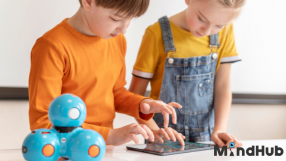
In the last few years, the desire for extracurricular programs has increased for parents. One of the reasons for this is the gaps they find in school, and another factor is the need they feel for their children and the needed development. The benefits of these activities certainly have a tremendous impact on the mental and physical growth of children.
Of course, everything has to be balanced. Out-of-school various activities can help children grow, but they can also burden them, so we decided to look at both points of view and share with you the pros and cons of educational activities after school.
The positive effect of leisure activities
Each child begins from an early age to develop their personal preferences and interests in the new and unknown. Whether as a result of a TV show, a favourite gift or after inspiration from other children and friends.
No matter what you choose - sports or an additional educational course like the ones from the MindHub program, you will undoubtedly contribute to the development of many new skills in your child.
Those activities help children to learn more about their interests, to join new groups with children and also develop their communication skills by sharing their passions and interests with them.
Furthermore, this way, you also encourage time management skills. Children acquire new logical abilities and are inspired to find solutions to problems.
They get new habits, enter into a routine and follow a structure; therefore, they learn even more about discipline and responsibility. Research shows that students involved in extracurricular activities generally perform much better academically.
Engagement in educational courses helps develop not only essential skills but also raises interests in children. With the beginner's class at MindHub, they can get into the world of programming and robotics and decide for themselves which aspect they want to study next and which one will be most exciting for them.
Children between the ages of 6 and 12 are at the age when they can most easily absorb new information and use it to their advantage. Their minds are open to new horizons and encouragement through various activities is one of the best things you can do for them and their future.
The good thing about most educational courses is that they focus on the interactive presentation of information and so the children do not feel like they are at a "second school", but accept the time spent for fun and interesting. MindHub mentors are continually trying to use non-standard and innovative approaches so that kids can understand easily and with interest. The techniques they use are block games, 3D games and much more.
If their interest is well aroused, they could turn that into a hobby and the hobby later into a profession. By allowing them to get closer to different areas and enrich their knowledge in them, you are actually helping them to build the foundations for their future.
Remember that this type of educational activities after school are not every day, but once or twice a week. This is enough, and at the same time not too binding, to make them feel burdened or you - financially worried.
The disadvantages of activities after school
It is known that if children stay busy outside the school for too long and lack the free time to play and rest, this can lead to stress, anxiety and even depression.
Too much time spent during these kinds of activities gets them to a sense of obligation and sometimes provokes negative emotions in children. They begin to feel that they do that by force, instead of voluntarily.
This, of course, must be balanced so that the child's time can be valuably spent - both during games and educational activities.
One of the main disadvantages for children, when they are not playing with friends is the lack of natural communication. In such an environment, they develop their ability to deal with the unexpected and find ways to solve sudden problems.
Fortunately, there are educational courses that try to keep this effect to the maximum. That is why the activities at MindHub are focused on a free atmosphere, group exercises and exciting approaches.
How to find the balance?
Prepare a calendar for the children and distribute their activities correctly. Allow time for play, but also add extracurricular educational activities.
Allow them to choose what they want to do after school, but also encourage interactivity.
Balance the time with family. Spend valuable time together in relaxation and various activities.
Talk to them and consider their attitude and mood. If they have started a course on logical tasks, for example, but you see that it doesn’t bring a spark for them any longer, they are reluctant to go, and this affects their performance and results, then maybe it's time to try something else.
Only through balanced activities and a relaxing holiday can you ensure that your children feel good by doing what excites them, ignites their interest and brings back the smile on their faces.


